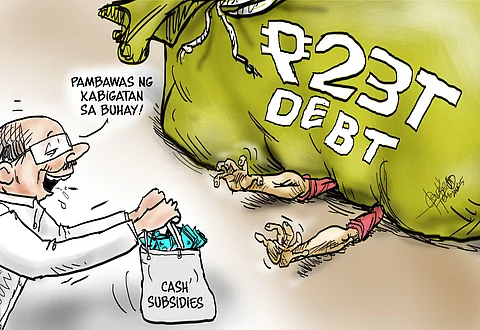
- NEWS
- the EDIT
- COMMENTARY
- BUSINESS
- LIFE
- SHOW
- ACTION
- GLOBAL GOALS
- SNAPS
- DYARYO TIRADA
- MORE

The debt problem is a potential constraint on the economy attaining its full potential — which is achieved through factors that depend, in a way, on efficient budget allocations.
At 62 percent of gross domestic product (GDP), while not yet at crisis proportions, interest and principal payments now compete with the provision of services and productive investments.
The sovereign debt climbed to an unprecedented P17.27 trillion, or an increase of more than P4 trillion in just three years of the Marcos administration. Economists have blamed the upswing on low revenues which, in turn, was the result of wrong priorities.
Centering on the provision of cash subsidies to battle poverty as a fiscal policy has backfired.
During the term of President Noynoy Aquino, the national debt was P5.3 trillion.
Senator Panfilo Lacson, who has made it his crusade to monitor the country’s fiscal health, said that after the term of President Rodrigo Duterte, the figure grew to P13 trillion.
After three years of President Ferdinand Marcos Jr., the debt has hit P17.25 trillion.
Some projections in the business sector estimate the obligation would reach P23 trillion by the time Marcos steps down in 2028.
“The situation is dangerous as the time may come that we would not be able to sustain the yearly budget because of the rising deficit,” Lacson pointed out.
Borrowing money is not bad in itself, he noted, “if we invest this money in productive projects.”
He explained: “For instance, a family wants to set up a sari-sari store but they lack capital, so borrowing is necessary.”
With the capital, the sari-sari store would have to earn its return on investment to pay back its debt and, at the same time, make the family self-sufficient.
The issue in the government’s case is that the borrowed funds are misused, with most ending up in the pockets of corrupt officials.
Commitment should be demonstrated by holding those in government responsible.
“There should be a certainty of punishment for the perpetrators of graft — if not it would just embolden corruption,” Lacson indicated.
Persistent budget shortfalls, exacerbated by lower tax revenues during economic slowdowns and increased public spending, have forced the government to borrow more.
An oversized debt also creates a vicious cycle of weakening the currency, which in turn raises the cost of servicing foreign-denominated debt.
Turning to domestic borrowing, conversely, has the effect of crowding out the private sector in securing funds from banks.
Allegations of corruption and mismanagement are rooted in the lack of transparency.
When borrowings are misused, the country has to contend with the debt, but without the economic benefits, increasing the burden on taxpayers.
The bloated debts are projected to consume 20 to 25 percent of the yearly appropriations, limiting the fiscal space.
If global interest rates rise or the peso weakens further, debt servicing costs could spiral, potentially leading to higher and newer taxes or reduced public services.
The debt problem is escalating into a crisis due to the predisposition towards non-productive subsidies.
